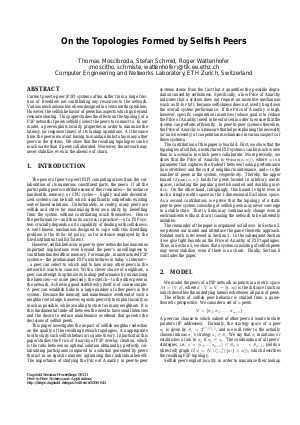On the Topologies Formed by Selfish Peers
Authors Stefan Schmid, Thomas Moscibroda, Roger Wattenhofer
-
Part of:
Volume:
Dagstuhl Seminar Proceedings, Volume 6131
Part of: Series: Dagstuhl Seminar Proceedings (DagSemProc) - License:
 Creative Commons Attribution 4.0 International license
Creative Commons Attribution 4.0 International license
- Publication Date: 2006-12-15
File

PDF
DagSemProc.06131.4.pdf
- Filesize: 146 kB
- 5 pages
Document Identifiers
Subject Classification
Keywords
- Churn
- Selfishness
- P2P Topologies
Metrics
- Access Statistics
-
Total Accesses (updated on a weekly basis)
0Document
0Metadata
Abstract
Many P2P systems are only proven efficient for static environments. However, in practice, P2P systems are often very dynamic in the sense that peers can join and leave a system at any time and concurrently. In the first part of my talk, I will present a DHT we have developed recently in our group which maintains desirable properties under worst-case churn. In the second part of my talk, we will briefly look at another challenge of prime importance in P2P computing, namely selfishness. Concretely, some results are presented concerning the impact of selfish behavior on the performance of P2P topologies.
Cite As Get BibTex
Stefan Schmid, Thomas Moscibroda, and Roger Wattenhofer. On the Topologies Formed by Selfish Peers. In Peer-to-Peer-Systems and -Applications. Dagstuhl Seminar Proceedings, Volume 6131, pp. 1-5, Schloss Dagstuhl – Leibniz-Zentrum für Informatik (2006)
https://doi.org/10.4230/DagSemProc.06131.4
BibTex
@InProceedings{schmid_et_al:DagSemProc.06131.4,
author = {Schmid, Stefan and Moscibroda, Thomas and Wattenhofer, Roger},
title = {{On the Topologies Formed by Selfish Peers}},
booktitle = {Peer-to-Peer-Systems and -Applications},
pages = {1--5},
series = {Dagstuhl Seminar Proceedings (DagSemProc)},
ISSN = {1862-4405},
year = {2006},
volume = {6131},
editor = {Anthony D. Joseph and Ralf Steinmetz and Klaus Wehrle},
publisher = {Schloss Dagstuhl -- Leibniz-Zentrum f{\"u}r Informatik},
address = {Dagstuhl, Germany},
URL = {https://drops.dagstuhl.de/entities/document/10.4230/DagSemProc.06131.4},
URN = {urn:nbn:de:0030-drops-6431},
doi = {10.4230/DagSemProc.06131.4},
annote = {Keywords: Churn, Selfishness, P2P Topologies}
}
